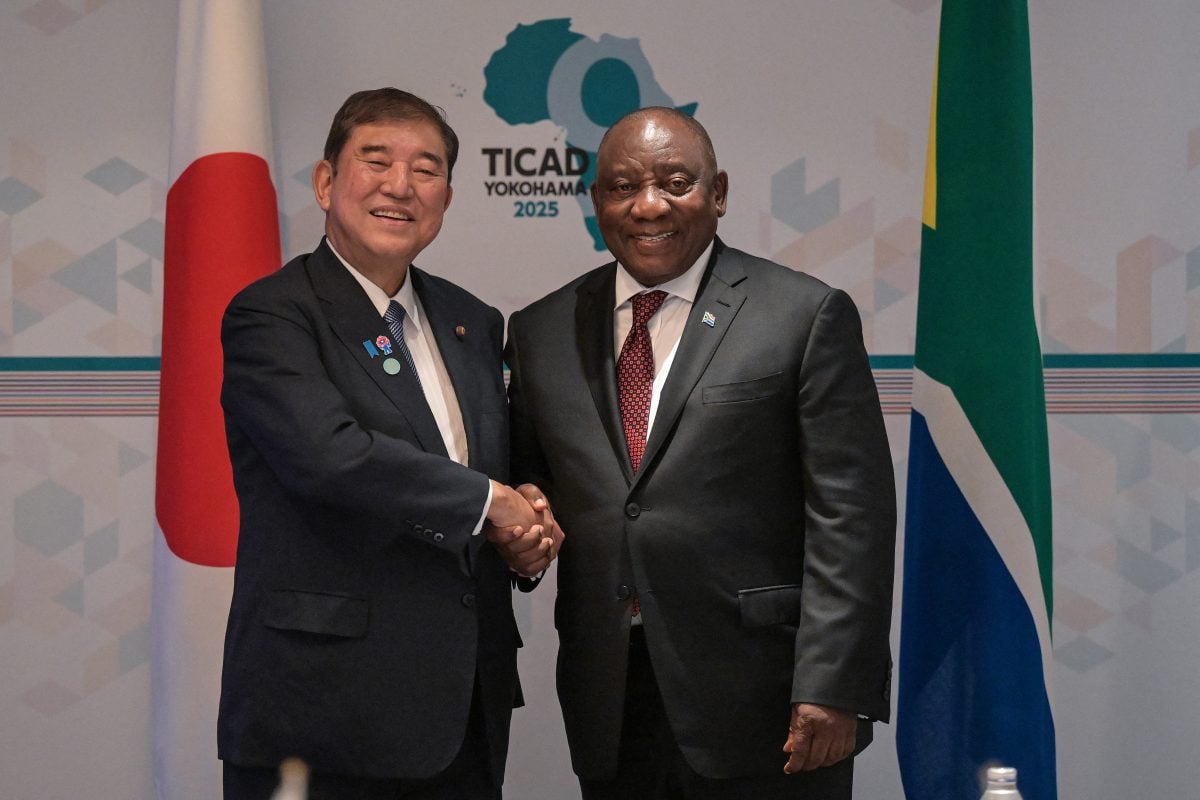The government of South Africa hosted a high-level business forum on the sidelines of the 9th Tokyo International Conference on African Development, in a bid to position itself as a leading destination for Japanese investment and a strategic gateway into Africa.
The event at the Hyatt Regency Yokohama, brought together more than 100 business leaders from South Africa and Japan, alongside senior government officials, to engage on investment opportunities and explore new areas of partnership.
South Africa’s President Cyril Ramaphosa (pictured right), who delivered the keynote address, expressed the hope that ties would be deepened further as the world grapples with economic challenges.
But he also urged for more speed in trade negotiations, using the example that it took 15 years for the two countries to agree on terms for Japan to be able to import avocado from South Africa.
With the implementation of the African Continental Free Trade Area underway, Ramophosa said investors could take advantage of this significant “enabler” by using South Africa as a gateway to reach the 1.3 billion-strong African market.
“We invite Japanese businesses to co-invest with us in value chains anchored in South Africa that serve the continental market. South Africa is firmly behind the African Union’s economic priorities, particularly when it comes to infrastructure, connectivity, climate adaptation, and industrialisation,” he stressed.
“Our continent is clearly on the move and that means that Japanese companies must open their eyes and see what Africa has to offer,” he stressed.
Ramaphosa lauds tariff adjustment
Ramaphosa also thanked Japan for its willingness to consider lowering tariffs for partners facing economic difficulties.
“Japan is a key pillar in our outreach and Prime Minister [Shigeru] Ishiba’s (pictured left) recent remarks on Japan’s willingness to adjust tariffs for strained partners signal an alignment that could underpin deeper bilateral trade cooperation between the two countries. This business forum provides a great opportunity to focus on what we have done so far, the opportunities that exist between our two countries, and how we can tap into the benefits for a greater partnership going forward,” Ramaphosa said.
The president noted that despite current challenges – the IMF expects South African GDP to grow by just 1% this year – the country remains an attractive destination for businesses, including 270 Japanese companies operating in the country which account for about 250,000 jobs.
“We are expanding economic capacity and improving the efficiencies of our economy. We are also working to improve policy certainty, so that we are seen as reliable partners who can be trusted to stick to policy. We also have adequate investment protection mechanisms to reduce the risk that many businesses would normally fall prey to.”
The president expressed his hope that a state visit could be arranged between the two countries in the near future.
Speaking during a panel discussion at the forum, Kgosientsho Ramokgopa, South Africa’s minister for electricity and energy, highlighted the country’s transition towards a cleaner and more diversified energy mix. He noted that 7.2 GW of renewable power is feeding into the grid, with additional projects set to push renewables to nearly a quarter of total generation in the next few years – a rate which climate experts say is much too slow.
“We are beginning to see a structural shift in our projections that, in the next two to three years, about 23% of electricity generation will come from renewable sources,” he said.
The minister stressed that investment in transmission infrastructure will be critical to unlocking this growth, with 14,000 km of new lines and an estimated $25bn required. He invited both South African and Japanese businesses to play a leading role in this expansion.
“There is an opportunity for you to participate in transmission expansion and modernisation,” he emphasised, pointing to reforms that now enable private sector generation and direct power transactions as fresh avenues for investment.
B20 Sherpa Cas Coovadia, highlighted public-private partnership in the energy logistics sector over the past four years, which he said reflects “the confidence of South African business in our own country.”
Japanese executives talk up South Africa
Japanese investors were similarly optimistic about the developing relationship.
Takafumi Suzuki, executive vice president of the Japan External Trade Organisation (JETRO) noted that while the conference is taking place in a challenging international environment, it presents an opportunity to “create and rebuild new relationships between Africa, South Africa, and Japan.”
Toshi Imai, president and chief executive officer of the Toyota Tsusho Corporation recalled the launch of Toyota South Africa’s first hybrid car in 2021, noting that the hybrid has since become one of South Africa and Africa’s best-selling vehicles.
“South Africa is so important for Toyota and Toyota South Africa is a brand for Africa and with the AfCFTA coming, cars produced in South Africa will go to the African continent. South Africa is a gateway for Africa,” he said.
In her closing remarks, Ipeleng Selele, chairperson of Brand SA, which hosted the event, said the focus now must be on action, noting that “implementation is the name of the game.”
Want to continue reading? Subscribe today.
You've read all your free articles for this month! Subscribe now to enjoy full access to our content.
Digital Monthly
£8.00 / month
Receive full unlimited access to our articles, opinions, podcasts and more.
Digital Yearly
£70.00 / year
Our best value offer - save £26 and gain access to all of our digital content for an entire year!

 Sign in with Google
Sign in with Google 



